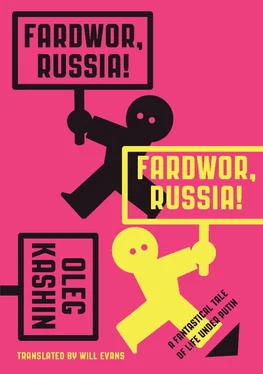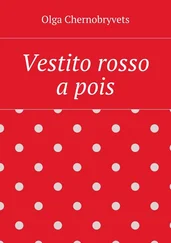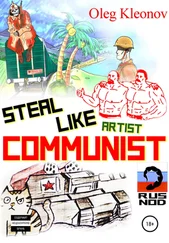Much of the humor in the novel comes from the wry repurposing of snippets from the news. The title comes from Dmitry Medvedev’s bumbling attempt to bring the Kremlin into the digital age by enthusiastically signing up for Twitter—only to misspell his own slogan in his very first tweet. An account mocking his tweets, @KermlinRussia, quickly gained hundreds of thousands of followers. The novel’s basic conceit—a mystical elixir that makes midgets grow—is an obvious metaphor for the entire Medvedev era. The corrupt self-interest and wave of violence it inspires are all too familiar from contemporary Russian life. In its provincial petty criminality, the attack on the shed where the protagonist, the scientist Karpov, is experimenting on pigs, echoes the past of Turchak, who, Kashin claims, once drove around the factory shooting at stray cats from his car window. Several characters are obvious stand-ins for or composites of prominent political figures in the Medvedev era. Arkady Magomedov, the shadowy banker, gets his names from Arkady Dvorkovich, a top Medvedev aide, and the Magomedov brothers, university classmates of Dvorkovich’s who rose to wealth and influence during his tenure. Close to Zero is a brazen stand-in for Vladislav Surkov, the master of the Kremlin’s smoke-and-mirror politics, who once wrote a novel, Almost Zero , under a pseudonym. Others, like the host of the trashy chat show Let Them Talk , are transposed straight into the novel. Kashin rips details straight from the headlines about Olympstroi, the company accused of misusing state funds for the Sochi Olympics, and goes on for several pages.
Rewriting the realities of contemporary Russia as science fiction allows Kashin to draw out some of the era’s absurdities. In genre terms, the novel is a perversion of the Soviet science fiction tradition, which told stories of heroic Soviet scientists facing down threats either from capitalists or suspiciously capitalistic alien races. The novel’s plot is borrowed from Patent AB , a 1948 novel by Lazar Lagin, set in the fictitious capitalist country of Arzhanteiya. Steven Popf, Lagin’s main character, is an idealistic young scientist who, like Karpov, comes up with an ingenious new way to make objects grow in the hope of increasing meat production. However, Popf quickly runs into resistance from Primo Padrale, Arzhanteiya’s top capitalist, who wants to use his invention to monopolize the market. After Popf refuses to sell it, Padrale steals it and has Popf jailed on false murder charges. Though Arzhanteiya’s communists help Popf get out of jail, he loses his laboratory and control over his invention. By changing the setting but leaving the essential details of the plot untouched, Kashin turns a didactic Soviet warning of the evils of capitalism into a comic indictment of Russian culture—where the Soviet Union itself was the greatest science fiction project of all—and the rapacious greed undercutting it. Medvedev’s concept of “modernizing” Russia in top-down, Soviet-style fashion without touching the country’s entrenched, retrograde bureaucracy, is mocked through the concept of a “modernizational majority,” a play on “Putin’s majority” his spin doctors created from the disenfranchised losers of the capitalist transition. Kashin would go on to indict the marriage of communism’s Big Lie to gangster capitalism in his letter to Putin and Medvedev:
Your superstitions and your mysticism—your vision of the world that’s something out of those 1980s samizdat conspiracy theories about Freemasons, and your pseudo-Russian Orthodoxy (which would have appalled Christ)—it all long ago turned you into a totalitarian sect. Most importantly, this sectarianism merged and multiplied with your old friend, the criminal ethics that ruled St. Petersburg in the 1990s. It is precisely this combination of sectarianism and gangster ideas about the nobility of absolute loyalty that make you pick Turchak, when choosing between him and the law.
Ultimately, provincial gangsterism subdues the novel’s liberal characters and is revealed to pervade the entire state itself; the narrator calls it a “scum of stagnation” that envelops them all at the novel’s end. “Big systems always have logistical problems,” he jokes. Elena Nikolaevna, the institute director in Fardwor, Russia! , is only interested in Karpov’s invention as a means to climb the bureaucratic ladder. The narrator describes Nikolaevna’s plan as “simple: she had to have something when she went to Moscow. She didn’t have that ‘something,’ but Karpov did. She didn’t care why he was occupied with that ‘something,’ but it would be useful for the institute to have an idea—any idea—one that sounded good, whether or not it could be realized, something based on any sort of laboratory experiments.” The other characters see Karpov’s invention as a means of self-enrichment or (literal) growth, rather than a scientific contribution to society. Once the truth about the serum gets out, Medvedev’s own real-life health minister, Gennady Onishchenko, is dispatched to cover it up with an absurd explanation about its real uses. The regime standing in for Medvedev’s eventually exhausts itself and is swept off by the rotten core of the system it failed to improve. The narrator explains that “the project for the accelerated growth of the modernizational majority would be recognized as a mistake and would lead to some high-profile resignations in the Presidential administration and in the United Russia political party.” Meanwhile, “a modernizational majority would form all by itself, and would vote in the 2012 elections for that national leader of the two whom the leaders themselves would pick in a simple game of drawing matchsticks.”
Events in the Russia of real life transpired in much the same way as in Fardwor, Russia! , although this offers the author little solace. The novelist Vladimir Sorokin described the prophecies of his 2006 novel Day of the Oprichnik , in which a future Russia is ruled by an isolationist, reactionary tsar strikingly similar in rhetoric and culture to the Kremlin’s inhabitants a decade after the book’s publication, as a cause for despair. “Honestly, it all made me depressed. As a writer I’m satisfied, but as a citizen I’m really not,” he told interviewers in 2013. “Still, there’s a difference between literature and life. Fortunately,” he added. [10] http://www.gq.ru/magazine/featured/54702_kak_sorokin_predskazyvaet_budushchee_rossii.php
For Kashin, a writer whose fiction draws so closely on real life and whose work as a reporter saw him become part of the story himself, that minimal difference offers him little protection. The most horrifying and grotesque details come from everyday life. “That’s always what seemed the most interesting thing to me,” Kashin wrote in the blog post exposing his attackers, describing a photograph of one of the security guards. “Obviously, they’re not people from some kind of hell; they’re ordinary citizens who walk the same streets as you and me, wear shirts, eat grapes and sausage, smile for photographs, go to the movies with their girlfriends, enjoy life and consider themselves happy. I don’t see anything in that photograph that would show us that he’s some sort of particularly nasty person who could grab an iron bar and beat the crap out of my head fifty or so times. I still haven’t understood this, so I’m going to look at that photograph some more and think (with that same head, smiley face).” Kashin’s novel forces readers to confront that same problem. Is his Russian grotesque actually all that horrible? Or is the real life behind it more grotesque still?
FOR WHATEVER REASON there were no buses waiting on the tarmac at this airport, and a line of stooping passengers, stretching to the dark concourse, was the first thing that Marina saw when they exited the plane among the last of the passengers.
Читать дальше




![Stephan Orth - Behind Putin's Curtain - Friendships and Misadventures Inside Russia [aka Couchsurfing in Russia]](/books/415210/stephan-orth-behind-putin-s-curtain-friendships-a-thumb.webp)






